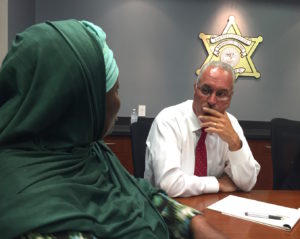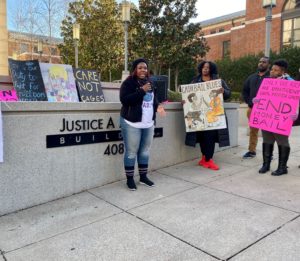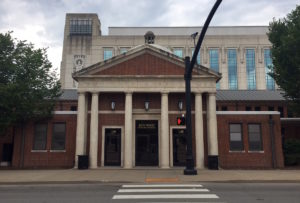
As the coronavirus continues to spread through Tennessee, one group is particularly vulnerable: people in jail.
Many suffer underlying health conditions. Plus, they’re locked into tight quarters, often without regular access to soap or hand sanitizer.
Law enforcement officials are now grappling with how to balance public safety and public health.
Like everybody else, Nashville’s criminal justice system is adjusting to a new, COVID-19 normal. But not everyone agrees on what that new normal should look like.
The courts have halted almost all in-person proceedings at least until the end of the month. And in the next few days, Davidson County Sheriff Daron Hall said he plans to double the number of people using the jail’s pretrial release program.
“We can’t do it the way we’ve always done it,” the sheriff says.
Hall says this crisis is unlike anything he’s experienced before. And that law enforcement agencies need to work together — not just go about “business as usual.”
 Tony Gonzalez WPLN News
Tony Gonzalez WPLN NewsDavidson County Sheriff Daron Hall, right, says the COVID-19 outbreak is not the time for “business as usual.”
“If everybody would find that different way of doing what we do, then I believe we could all get some impact,” Hall says. “But, you know, the sheriff can’t do it. The public defender can’t do it. Police chief can’t do it. The courts can’t do it. We all have to do something to make a dent in this, you know, this problem.”
Nashville Public Defender Martesha Johnson has urged law enforcement to take steps to reduce the jail population during the coronavirus outbreak.
She asked the sheriff’s office to release people considered high-risk for infection by the Centers for Disease Control, as well as other individuals charged with minor offenses, unless they pose a serious threat to the community. She also requested that the courts postpone non-essential cases, especially if the accused was already out on bond.
“The consequences of a COVID-19 outbreak in Nashville’s jails would be particularly devastating, will threaten the public at large, and efforts to contain the spread of illness would be costly to the city,” Johnson wrote in a press release last week.
And in a letter signed by 20 groups the next day, criminal justice reform advocates made their own set of recommendations, including to cease immigration enforcement and provide incarcerated individuals with free access to medical care and phone calls.
“As concerns about COVID-19 mount, we, as residents of Nashville, grow increasingly concerned about the health of our friends and loved ones who are currently incarcerated at the Davidson County Jail,” they wrote. “We need a more comprehensive plan to safeguard the health of the people being held and the staff who are working there.”
There have also been calls to release people arrested for low-level offenses without charging them bail. And for the police to write more citations, instead of arresting people.
But misdemeanor arrests have actually increased in the past two weeks. A spokesperson for the Metro Nashville Police Department told WPLN News earlier in the week that officers were not easing up on arrests.
Hall says that needs to change. He doesn’t want to send people home, just so that others take their places.
“You can wait and make some of these physical arrests when we get our norm back,” he says. “Well, if the police aren’t gonna curb their activities, then that’s, you know, that’s wasting resources in the police department, wasting resources and putting my staff at extreme risk. And we can need to do better than that.”
Rahim Buford says it’s time for local leaders to act.
“At a time like this, we can’t play politics, because people’s lives are in danger.”
 Samantha Max WPLN
Samantha Max WPLNAdvocates for bail reform have asked officials to release individuals arrested for minor crimes without requiring that they pay bail.
Buford manages the Nashville Community Bail Fund, a nonprofit organization that bails out people accused of low-level crimes who can’t afford the cost.
He says a lot of people have been calling since fears started growing about the virus. More than he can free on his own.
And Buford says a lot of people stuck in jail are unhealthy.
“Those who are elderly in jail, or even in prison, who have compromised immune systems, who have various debilitating diseases, they are at risk right now as we speak,” he says.
Many people in jail are medically fragile. According to the Bureau of Justice Statistics, nearly 45% have suffered from a chronic condition at some point, compared to about 27% of the general population.
They’re also far more likely to have high blood pressure, heart issues and asthma. And that can put them at a higher risk for complications, if they get the coronavirus.
“You are looking at people who literally cannot maintain a six-foot social distancing guidance, because they are living very close together,” says Jasmine Heiss. She’s a campaign director at the Vera Institute, a Brooklyn-based organization that advocates for criminal justice reform.
“They’re coming into that situation already in a tremendously vulnerable place,” she says.
Heiss says if drastic action isn’t taken, jails could see disproportionately high death rates. And she says that would be an excessive punishment for the inmates — many of whom haven’t even gone to trial.
“Given that the vast majority of people who are in jail are unconvicted, are serving sentences for fairly low-level offenses or have been locked up, for example, for violating the terms of their supervision,” Heiss says, “I think we all need to ask ourselves really critically, should that be a death sentence?”
Nashville’s sheriff and public defender are planning to release medically high-risk inmates, including several pregnant women. Work release participants are also being sent home.
 WPLN News
WPLN NewsDavidson County’s courts, along with judicial systems throughout Tennessee, have suspended nearly all in-person proceedings, in light of the coronavirus pandemic.
Davidson County Presiding Judge Lynda Jones says judges are not being told to “give everybody a pass,” especially if someone faces violent charges.
Jones says judges have a lot of discretion. Which makes it hard to set a standard protocol.
“There’s a lot of players at the table. There’s not, like, one person who decides,” she says. “Everything’s on a case-by-case basis, because everything’s so unique. You can’t really have one blanket rule.”
But Jones says the courts are doing their best to avoid filling up the jails.
She says that, at this point, none of the inmates has been diagnosed with COVID-19. And that locking fewer people up will help keep those odds low.
“It’s, you know, kind of changing daily,” Jones says, “and we’re all trying to protect the public’s safety but also be mindful of, is it really necessary to have a DUI case serve his jail time in March or could he serve his jail time in April?”
Still, it’s not just up to the courts and the sheriff. Police and prosecutors ultimately decide who gets locked up in the first place.
The police department just announced it would give officers more discretion to write citations, instead of arresting people for misdemeanors.
The district attorney’s office hasn’t announced any plans to send fewer people to jail yet.
Samantha Max is a Report for America corps member.

